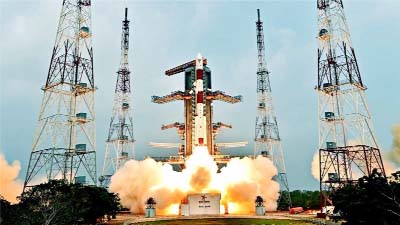
Al Jazeera News :
Indian officials say their country will set up a satellite tracking and imaging centre in southern Vietnam that will give Hanoi access to pictures from Indian earth observation satellites that cover the region – including China and the South China Sea.
The move could heighten tensions between the two countries and Beijing. Both states have long-running territorial disputes with China.
India also extended a $100m credit line for Hanoi to buy patrol boats and is training Vietnamese submariners in India, while Hanoi has granted oil exploration blocks to India in waters off Vietnam that are disputed with China.
The facility will be equipped to receive images from India’s earth observation satellites that Vietnam can use in return for granting India the tracking site, said an Indian government official connected with the space programme.
“This is a sort of quid pro quo which will enable Vietnam to receive IRS [Indian remote sensing] pictures directly, that is, without asking India,” said the official, who declined to be identified because he was not authorised to speak to the media.
“Obviously it will include parts of China of interest to Vietnam.”
Earth observation satellites have agricultural, scientific and environmental applications, but can also provide military intelligence. Indian media put the cost of the station at about $23m.
India – whose 54-year-old space programme is accelerating with one satellite launch scheduled every month – has ground stations in the Andaman and Nicobar islands, Brunei, Biak in eastern Indonesia and Mauritius that track its satellites in the initial stages of flight.
The Vietnam facility will bolster those capabilities, Indian Space Research Organisation spokesman Deviprasad Karnik said, according to Reuters news agency.
Indian officials say their country will set up a satellite tracking and imaging centre in southern Vietnam that will give Hanoi access to pictures from Indian earth observation satellites that cover the region – including China and the South China Sea.
The move could heighten tensions between the two countries and Beijing. Both states have long-running territorial disputes with China.
India also extended a $100m credit line for Hanoi to buy patrol boats and is training Vietnamese submariners in India, while Hanoi has granted oil exploration blocks to India in waters off Vietnam that are disputed with China.
The facility will be equipped to receive images from India’s earth observation satellites that Vietnam can use in return for granting India the tracking site, said an Indian government official connected with the space programme.
“This is a sort of quid pro quo which will enable Vietnam to receive IRS [Indian remote sensing] pictures directly, that is, without asking India,” said the official, who declined to be identified because he was not authorised to speak to the media.
“Obviously it will include parts of China of interest to Vietnam.”
Earth observation satellites have agricultural, scientific and environmental applications, but can also provide military intelligence. Indian media put the cost of the station at about $23m.
India – whose 54-year-old space programme is accelerating with one satellite launch scheduled every month – has ground stations in the Andaman and Nicobar islands, Brunei, Biak in eastern Indonesia and Mauritius that track its satellites in the initial stages of flight.
The Vietnam facility will bolster those capabilities, Indian Space Research Organisation spokesman Deviprasad Karnik said, according to Reuters news agency.
India has 11 earth observation satellites in orbit, offering pictures with differing resolutions and areas, the ISRO said.
Vietnam is one of several Southeast Asian nations involved in a territorial dispute with China over the South China Sea.
Beijing has accelerated its construction of man-made islands in the disputed waters to assert its claim to the sea, which is believed to hold vast oil and natural gas reserves.
Earlier in January, Vietnam accused China of violating its sovereignty when it landed a plane on an airstrip built on an artificial island in the Spratly archipelago.
China’s foreign ministry rejected the complaint, arguing the flight was a matter “completely within China’s sovereignty”.

